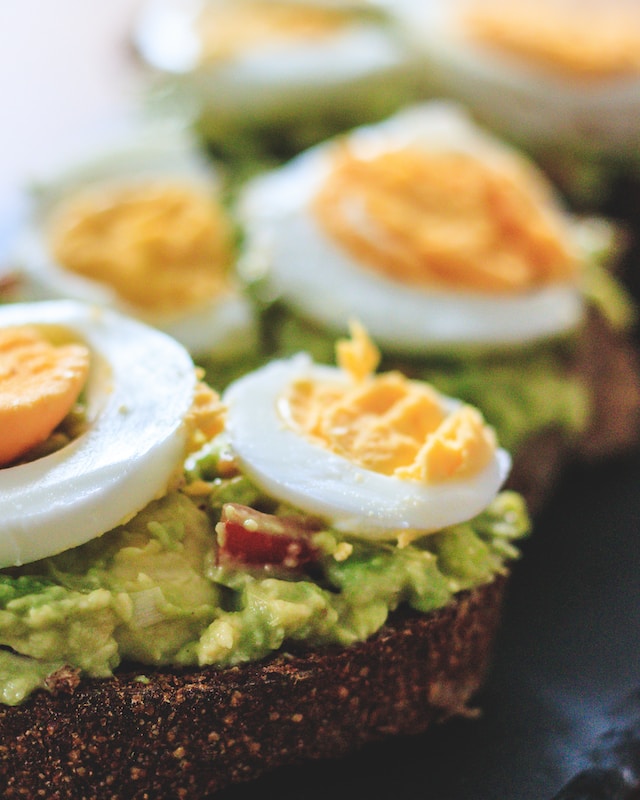Are Eggs Keto? Your Guide To Eggs In The Ketogenic Diet
Ever stared at a carton of eggs in your fridge, asking yourself “are eggs keto?” You’re not alone. It’s like standing on the edge of an omelette-shaped cliff, unsure if taking that leap will land you safely within your diet goals or hurl you into a carb-loaded abyss.
We get it – figuring out what fits into the ketogenic puzzle can feel as complex as cracking the code to some secret culinary society. But don’t scramble just yet! This post is about to be your trusty guide through this eggy enigma.
As we continue on this journey, we’ll delve into the reasons why eggs are deemed a superfood in high-fat diets. We’re going to unpack their nutritional value too. By the time you finish reading, not only will your egg-related questions be answered, but you’ll also discover tasty methods to include them in your everyday meals.
Eggs on Keto: Essential Nutritional Information
Eggs are more than just a breakfast staple; they’re also nutritious powerhouses. An average large egg contains a wealth of essential nutrients, making it an ideal food for those looking to maintain their health.
But wait, there’s more. The yolk hides most of an egg’s nutritional goldmine, providing vitamins A, E, and D. They help support eye health, boost your immune system and even promote bone strength. Quite a punch for such a small package.
It’s no wonder then that eggs have become one of the most popular keto kitchen staples around the world. If we had to sum up all these nutritional facts about eggs in one sentence, it would be that they’re not just versatile but great sources of several vital nutrients as well.
Essential Medical Info about Eggs That You Need to Know
An egg fast can do wonders if you want to lose weight. Why so? Because eggs trigger hormones that increase feelings of fullness. This is fantastic news if you’re aiming for fat loss.
Let’s break down the science behind this: when we eat protein-rich foods like eggs, our body releases a hormone called GLP-1 (glucagon-like peptide 1). This hormone tells our brain “Hey, I’m satisfied.” So, by eating more eggs (especially in the morning), we can help control those pesky hunger pangs throughout the day.
Sounds too good to be true? But here’s another fun fact: did you know one study found people who ate eggs at breakfast consumed fewer calories during lunch than those who had bagels instead?
If all these reasons weren’t enough – let me add one more perk of including these little nutritional bombs into your daily diet – variety. From boiled or scrambled eggs to omelets with cheddar cheese; there are endless ways how we can enjoy them while keeping our carb count low.
So, if you’re looking to lose weight, keep your blood sugar in balance, or maintain a healthy lifestyle on keto, eggs could be your new best friend. Remember: variety is the spice of life…and it also helps keep those pesky cravings at bay.
Health Benefits of Eggs on a Keto Diet

Eggs are an ideal food for those on easy keto diet, providing high-quality protein and important antioxidants. They not only contain high-quality protein that helps maintain muscle mass, but also pack in antioxidants lutein and zeaxanthin which can improve brain health.
With less than one gram of carbs per serving, eating eggs won’t disrupt ketosis – the metabolic state crucial to achieving benefits from this high-fat diet. Instead, it aids in maintaining stable energy levels throughout the day because its healthy fats provide long-lasting fuel for your body.
How Many Carbs Are in Eggs?
One large egg contains approximately 0.6 grams of carbohydrates. Eggs are generally low in carbs and primarily a good source of protein and healthy fats. Enjoy your eggs in various delicious ways without worrying too much about their carb content!
How Much Fat in One Egg?
An average large egg delivers 5 grams of healthy fat. With the majority of it being healthy monounsaturated and polyunsaturated fats. These fats can contribute to a well-balanced diet and provide essential nutrients. So, don’t shy away from enjoying eggs as part of your meals while benefiting from their good fats and other nutrients.
How Much Protein in One Egg?
A large egg is a great source of protein, providing around 6.3 grams of this essential nutrient. Protein is vital for building and repairing tissues, making it an important part of a diet. Including eggs in your meals can help you meet your protein needs while enjoying their delicious versatility.
Egg Yolks vs Egg Whites! Which Is beast?

Egg yolks and egg whites offer distinct nutritional benefits. The yolk contains healthy fats, vitamins, and minerals, while the whites are a great source of lean protein.
Both parts complement each other in a keto diet, and you can enjoy the whole egg for a well-rounded and nutritious meal. So, whether you prefer the yolk’s richness or the whites’ protein punch, eggs are a versatile and wholesome addition to your diet.
How Many Eggs Can You Eat on a Keto Diet?
On a keto diet, you can generally enjoy eggs liberally, as they are a fantastic source of protein and healthy fats while being low in carbohydrates. Many people on a ketogenic diet consume eggs daily, if not more frequently.
However, it’s important to balance your overall macronutrient intake and consider your specific dietary needs and health goals when incorporating eggs into your keto meal plan.
Best Ways to Prepare Eggs on a Keto Diet
For those looking to make egg dishes that are keto-friendly, there are a variety of ways to cook eggs that can be as simple or intricate as desired. Let’s explore some methods that’ll help keep your egg game exciting.
Different Ways to Cook Eggs for Keto
The simplest way to enjoy keto eggs is by boiling them. Scrambling offers another quick option, especially when cooked with olive oil, boosting healthy fat intake. For an elegant breakfast, try poaching – but remember not all sauces are keto-friendly.
Baking eggs isn’t just about quiches. From simple baked eggs in avocado halves to more elaborate dishes like the spicy Egg Cups, baking allows flavors time to develop without adding extra carbs. There are many healthy foods that could be created with eggs as a main ingredient.
Favorite Egg Recipes

Mix things up with creative recipes such as an egg salad using boiled eggs and high-fat mayo; perfect on lettuce wraps or cucumber slices. Or give the popular ‘Eggs Benedict’ a twist: replace traditional English muffins with portobello mushrooms for lower carb count.
If you’re looking for comfort food turned keto, this creamy Chicken Egg Foo Young will hit the spot featuring cheddar cheese – plus it’s packed full of protein from crab meat and our hero ingredient – eggs.
Another creative lunch idea can be these Baked Cheese Eggs. Simple and delicious, and verrrry keto.
For breakfast, if you want something slightly different to the classic ways of serving eggs, try these Keto Egg Bites – they’re superior in every way (cheaper, healthier, and more delicious and keto-friendly) to the ones in Starbucks, even if we do say so ourselves.
An alternative would be these amazing Bacon Egg Cups, which you have to try.
And finally, this Egg Loaf is a protein-rich, low carb alternative to bread that will give you energy for the whole day.
Eggs Alternatives
If you’re looking for alternatives to eggs on a keto diet, there are several options available. You can use tofu, avocado, or chia seeds as egg replacements in various recipes.
These alternatives not only fit well within a low-carb, high-fat diet but also bring their unique flavors and textures to your meals. So, whether you’re vegan, allergic, or just want to switch things up, there are plenty of delicious ways to enjoy a keto-friendly diet without eggs.
Other Hints and Tips
Eggs fit perfectly into this nutritional model because they’re packed with healthy fats and protein yet contain minimal net carbs—only 0.5g per large egg. That makes eggs an excellent choice for those watching their carb intake.
Beyond being great for your daily macros balance, eggs are full-featured superfoods filled with essential vitamins and minerals vital for overall health—all wrapped up neatly in one shell.
This combination makes them ideal staples within any well-rounded keto kitchen. They offer versatility whether you prefer them scrambled at breakfast time or hard-boiled for quick snacks on the go. So, are eggs keto? Absolutely.
FAQs in Relation to Are Eggs Keto?
How many eggs can you eat on keto?
While there’s no set limit, most folks stick to 1-2 eggs per meal. Remember, balance and variety are key.
Can I eat all the eggs I want on keto?
Eggs are great for keto but moderation is crucial. Overconsumption could tip your macros out of balance.
Can you eat 10 eggs a day on a ketogenic diet?
You could, but it’s not advised. Eating such high quantities might skew your protein intake and overdo calories.
How do you eat eggs on a ketogenic diet?
Fry them in healthy fats like avocado oil or coconut oil; make egg salads with mayo; try an omelet loaded with cheese and veggies.
Conclusion

So, we’ve cracked the code: yes, eggs are keto. Eggs boast a low carb count and high nutrient density, making them an optimal choice for following the keto diet.
Eggs bring to the table not just protein and healthy fats but also essential vitamins like A, E, and D. They can be a beneficial sustenance source to help you feel satiated for an extended period.
The ways to cook eggs for a keto diet are as varied as their benefits – from boiled to scrambled or baked into mouth-watering recipes.
Beyond just weight loss support on a ketogenic diet, eating eggs offers potential health advantages including heart disease prevention and improved brain health thanks to antioxidants such as lutein.
In short? Don’t shy away from this eggcellent addition in your daily diet!
Written By



Comments are closed.